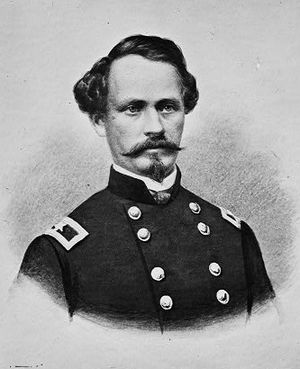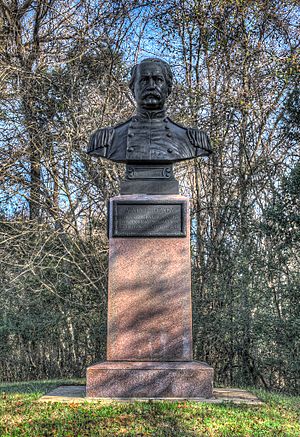Alvin Peterson Hovey facts for kids
Quick facts for kids
Alvin Peterson Hovey
|
|
|---|---|

Alvin P. Hovey as a brigadier general.
|
|
| 21st Governor of Indiana | |
| In office January 14, 1889 – November 23, 1891 |
|
| Lieutenant | Ira Joy Chase |
| Preceded by | Isaac P. Gray |
| Succeeded by | Ira Joy Chase |
| Member of the U.S. House of Representatives from Indiana's 1st district |
|
| In office March 4, 1887 – January 17, 1889 |
|
| Preceded by | John J. Kleiner |
| Succeeded by | Francis B. Posey |
| United States Minister to Peru | |
| In office May 22, 1866 – September 22, 1870 |
|
| Preceded by | Christopher Robinson |
| Succeeded by | Thomas Settle |
| Indiana Supreme Court Justice | |
| In office May 8, 1854 – January 1, 1855 |
|
| Preceded by | Addison Roache |
| Succeeded by | Samuel Gookins |
| Personal details | |
| Born | September 6, 1821 Mount Vernon, Indiana |
| Died | November 23, 1891 (aged 70) Indianapolis, Indiana |
| Political party | Republican |
| Signature | |
| Military service | |
| Allegiance | United States Union |
| Branch/service | United States Army Union Army |
| Years of service | 1844–1846 1860–1865 |
| Rank | |
| Commands | 24th Indiana Infantry Regiment 12th Division, XIII Corps 1st Division, XXIII Corps |
| Battles/wars | Mexican–American War American Civil War |
Alvin Peterson Hovey (born September 6, 1821 – died November 23, 1891) was an important figure in American history. He served as a general for the Union Army during the American Civil War. He also held several key government jobs. These included being a judge on the Indiana Supreme Court, a member of Congress, and the 21st Governor of Indiana.
During the Civil War, General Hovey was highly praised by General Ulysses Grant. He also helped uncover a secret plot in Indiana. As governor, he worked to change election rules. He passed away while still in office.
Contents
Early Life and Education
Overcoming Challenges in Youth
Alvin Peterson Hovey was born in Mount Vernon, Indiana, on September 6, 1821. His parents were Abiel and Francis Hovey. Sadly, his father died when Alvin was very young. His mother passed away in 1836, leaving him an orphan at age fifteen.
Alvin grew up in poverty. After his mother's death, he lived in an orphanage. He received a basic education there. At eighteen, he left the orphanage. Hovey dreamed of becoming a lawyer. He worked as a bricklayer during the day. At night, he studied law in the office of John Pitcher, a lawyer in Mount Vernon. After more than three years of hard work, he became a lawyer in 1843. He then opened his own law office.
A Case for Libraries
In 1849, Hovey became well-known across Indiana. He was chosen to manage the estate of William Maclure, a wealthy man who had passed away. Maclure was an idealist who helped start a failed community called New Harmony, Indiana. In his will, Maclure wanted his property sold to fund new libraries.
However, Maclure's siblings had already taken much of his estate. Hovey filed over sixty lawsuits to get the money back. His efforts were successful. The money helped open 160 libraries in Indiana and Illinois. This case received a lot of attention. Hovey became very popular because of his success. In 1844, he married Mary Ann. They had five children, but only two lived past infancy.
Shaping Indiana's Laws
In 1850, Hovey was elected as a delegate. He helped create a new constitution for Indiana. He supported changes to improve education and government. He also supported some controversial parts of the constitution. For example, he opposed voting rights for women and Black people. He even suggested banning free Black people from Indiana. This idea was accepted because some saw it as a way to challenge Southern states. However, the U.S. Supreme Court later ruled the anti-Black parts unconstitutional.
In 1854, Governor Joseph A. Wright appointed Hovey to the Indiana Supreme Court. Hovey was 34, making him the youngest justice ever on the court. He was also the only person who helped write the constitution to then interpret it as a judge. He ruled that all state schools must be funded equally. He tried to be elected to the Supreme Court but lost. He only served for six months.
In 1855, President Franklin Pierce appointed Hovey as the U.S. Attorney for Indiana. At this time, the Democratic Party in Indiana had problems over slavery. Hovey, who opposed slavery, was removed from his position. He then ran for Congress as an Independent but lost. After this, Hovey joined the Republican Party. Many other Democrats who opposed slavery also joined the Republicans.
Service During the Civil War

Leading Troops in Battle
When the American Civil War began in 1861, Hovey became a colonel. He organized the First Regiment of the Indiana Legion, a state militia. This group helped defend Indiana during the war. Soon after, he became colonel of the 24th Regiment Indiana Infantry. His regiment quickly went to the front lines. He led them in the Battle of Shiloh in 1862.
Hovey stayed with the main Union Army in the west. He was promoted to brigadier general. During the siege of Corinth, he led a brigade. In 1863, he commanded the 12th Division. He led his division at the Battle of Champion Hill. General Ulysses S. Grant praised Hovey for his leadership.
He also led his division in the Siege of Vicksburg. This battle helped the Union gain control of the Mississippi River. Grant again said Hovey was key to the victory. After the battle, Hovey learned his wife had died. He went home to care for his children. Her death deeply saddened him. He returned to the front in 1864. He commanded a division during the Atlanta Campaign. In August 1864, his division was broken up. Hovey returned home again. For the rest of the war, he commanded the military District of Indiana. He left the Union Army on October 7, 1865.
Protecting Indiana from Secret Plots
Back in Indiana, Governor Oliver P. Morton put Hovey in charge of the army units in the state. His main job was to oversee recruitment and stop anti-government activities. Hovey formed a division of ten thousand troops. He only accepted unmarried men. Because many of his soldiers were young, his division was called "Hovey's Babies."
Hovey's investigations uncovered secret groups. These included the Sons of Liberty and the Knights of the Golden Circle. He believed these groups planned an uprising in Indianapolis in August 1864. To stop the plot, he arrested many suspects. They were tried by military courts. Some were sentenced to hanging, but their sentences were changed to life in prison. After the war, the U.S. Supreme Court ruled these trials were unconstitutional. This happened in a case called Ex parte Milligan.
After the war, Hovey was promoted to major general. He then left the army. In 1865, he married Rosa Alice. She was the stepdaughter of Caleb B. Smith. Sadly, his new wife became ill and died before he left. Hovey was then appointed as the U.S. Minister to Peru. During his time there, Peru was often at war or having revolutions. Hovey spent much time trying to figure out who was in charge. In 1870, he resigned and returned to Mount Vernon to practice law again.
Governor of Indiana
Working with the General Assembly
In 1872, the Republican Party wanted Hovey to run for governor. But he said he was done with politics. For the next fourteen years, he worked as a lawyer. In 1886, he agreed to run for Congress and won. Two years later, he was nominated to run for Governor of Indiana. Benjamin Harrison was running for President that year and was very popular in Indiana.
Even with his party's popularity, Hovey barely won the election. He defeated Democrat Courtland C. Matson by a small margin. Democrats still had control of both houses of the Indiana General Assembly. At sixty-eight years old, Hovey became the oldest person elected governor at that time.
Before Hovey became governor, the General Assembly had passed laws to reduce the governor's powers. The legislature often disagreed with the governor. They would override his vetoes to pass their laws. Hovey tried to get some of the governor's powers back. He took many of the legislature's new laws to court. The courts ruled that the legislature could remove the governor's power to appoint people.
However, in another case, the assembly had created state boards to control local police and fire departments. This took control away from local governments. The courts sided with Hovey. They said these laws were unconstitutional. In a dispute over who could appoint new department heads, the court ruled that these heads must be elected by the public.
Important Reforms for Voters
The only major change Hovey was able to pass was voter reform. For several elections, Indiana had problems with voter fraud. The state had very few rules for voting. Political parties made their own ballots. They were responsible for including their opponents on their ballots. This led to tricks where parties would design ballots to confuse voters. Vote buying was also common. This caused a national scandal during Benjamin Harrison's election.
The new reforms created the secret ballot. Ballots became standard for everyone. There was more supervision at polling stations. The state government became responsible for creating ballots. These changes helped make elections fairer.
Hovey also promised to deal with the White Cap groups. These vigilante groups operated in southern Indiana. They had carried out violent acts, including lynchings. Hovey launched investigations into these groups. He made it clear he intended to stop them. Although no arrests were made, his actions led to a big decrease in their activities. Eventually, their actions stopped.
Death
In 1891, Hovey became ill. He died on November 23, 1891. His Lieutenant Governor Ira Joy Chase took over as governor. Hovey's body was honored in Indianapolis. Then, his remains were taken to his hometown for a funeral. He is buried in the Bellefontaine Cemetery near Mount Vernon, Indiana.
Electoral history
| Party | Candidate | Votes | % | |
|---|---|---|---|---|
| Republican | Alvin P. Hovey | 281,752 | 49 | |
| Democratic | Courtland C. Matson | 280,603 | 48.8 | |
| Prohibition | JS Hughes | 9,920 | 2.2 | |
See also
- List of governors of Indiana
- List of American Civil War generals (Union)
Images for kids
 | Mary Eliza Mahoney |
 | Susie King Taylor |
 | Ida Gray |
 | Eliza Ann Grier |

